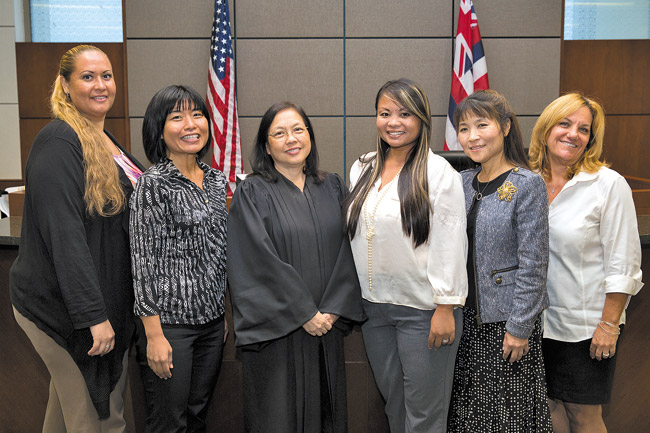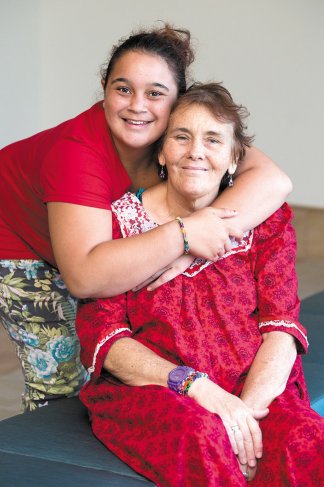Guidance For Girls
For a decade, Hawaii Girls Court has worked closely with troubled female adolescents and their families in an effort to improve their lives
It’s a Tuesday afternoon at Ronald T.Y. Moon Judiciary Complex in Kapolei, and court has just been called into session.
Gathered in the room is a group of teenage girls accompanied by parents or guardians, waiting to be called before presiding judge Jennifer Ching. All of the girls are on probation or protective supervision, many struggling with issues related to school, mental health or drugs.
mw-nm-091714-girls-court-2
As the first girl takes a seat up front with her father, Ching takes a moment to acknowledge her recent progress with a gift card.
It doesn’t appear to be like most case hearings, but that’s only because Hawaii Girls Court is much more than just another program for troubled female youths.
“It’s very individualized and tailored, and that does take a lot of time and effort to get to know them,” says program coordinator Dayna Miyasaki.
“But it’s so worth it because then we know we’re addressing the specific needs of the family and we’re not just doing a blanket, Band-Aid kind of thing.”
What is Girls Court?
Focusing her specialty on family law, Karen Radius was appointed a full-time judge in the mid-’90s.
There, she saw an increase in the number of girls being arrested. Many of their crimes were related to being runaways and committing other status offenses – things that would not normally be considered a crime for adults.
Juvenile justice itself, says Radius, was initially structured specifically for boys. So she began looking at other models to address the needs of girls.
“There were lots and lots of articles about what girls needed, what were the problems girls were facing,” she says, “but no ‘here’s a solution to it’ or ‘here’s a way to fix it.'”
In response, Radius established Hawaii Girls Court in September 2004, making it the first group in the nation to provide gender-specific rehabilitation for girls.
Since then, more than 100 girls and their families have experienced the program, which also caters to girls who violate the law.
“The idea is to try to work on the family issues, find out what’s going on in the girl’s life,” says Radius, who has since retired but remains closely involved with Hawaii Girls Court.
The girls of Girls Court
It isn’t easy listening to a hearing take place.
Some recount successes at passing a drug test, while others fall back on bad behavior – every detail exposed.
Later, Soana Vahai shares that, at about 12 years old, hanging out with the wrong group of friends led her to substance abuse with mostly crystal meth and marijuana.
“I was an active user,” she says. “I used every day until the day they locked me up – I was high until that moment.”
For nearly two years now, Vahai, now 16, has been a participant of Hawaii Girls Court with her mother, Debra Puailoa.
“She’s changed,” says Puailoa. “She’s my little girl; I got my little girl back.”
Vahai says her experience with Hawaii Girls Court has been for the better and that it has strengthened her relationship with her mother.
“I’ve learned a lot of things from her and about her, and she’s learned a lot of things about me and things she would never think of learning, so it’s good, she understands,” says Vahai.
All girls are required to participate with a parent or guardian, and attend monthly open-court sessions. Though initially daunting, Vahai says that it actually provides inspiration.
“We all see our weaknesses and our strengths, and we learn from it so it makes us closer in other ways too,” she says.
Activities outside of court also take place, allowing the girls to complete community service and meet with mentors, which the organization actively is seeking.
“Some of these kids maybe haven’t had that one constant positive person there, so you never know if one connection is going to do it,” says Ching.
Breaking the cycle
Beyond fulfilling legal obligations, Hawaii Girls Court seeks to drastically alter each girl’s life.
“So many of our girls – all, maybe – have been through so much trauma,” says Ching. “They’ve been through so many things; they’re really survivors and they’re so strong in so many ways.”
In its 10 years of existence, the program has yet to receive permanent funding.
Currently, donations to Girls Court may be made through Friends of Family Specialty Courts, which also covers Juvenile Drug Court and two other adult specialty courts.
“A lot of people will say, ‘Well, how much are you spending and does it really merit that much money for relatively few girls?'” says Ching. “It’s not just the girls, it’s the family, it’s the children they may bear later on. It’s circles and circles and circles.”
For more information, to make a donation or to inquire about becoming a mentor for Hawaii Girls Court, visit girlscourt.org.







